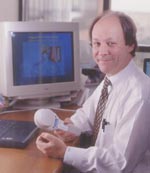International society honors
psychiatrist
Mark
S. George, M.D., MUSC Distinguished Professor of Psychiatry,
Radiology and Neurology, was selected to receive the Lifetime
Achievement Award in Biological Psychiatry from the World Federation of
Societies of Biological Psychiatry (WFSBP). George is a leader in neuropsychiatry, behavioral neurology, brain stimulation and brain imaging, having authored or edited five books and published more than 300 articles or chapters in professional journals including Biological Psychiatry, American Journal of Psychiatry and the Archives of General Psychiatry.
 Dr. Mark George
Dr. Mark GeorgeBeginning in 1994 while he was at the National Institutes of Health (NIH) in Washington, DC, George and his colleagues were the first to use prefrontal transcranial magnetic stimulation (TMS) therapy as an antidepressant treatment and were the first to successfully use TMS as a maintenance therapy. Later at MUSC, George and his team of scientists advanced their groundbreaking research by showing that it is possible to combine brain stimulation and brain imaging (fMRI). In 1998, George lead a team as they implanted the first treatment-resistant depression patient with a Vagus Nerve Stimulator (VNS) and subsequently showed the feasibility of performing functional brain imaging with VNS. VNS is now FDA approved as a treatment for depression.
Founded in 1974 in Buenos Aires, Argentina, the WFSBP is a non-profit, international organization composed of more than 50 national societies of biological psychiatry, representing more than 4,500 professionals. As a world authority on biological psychiatry, WFSBP is also committed to pioneering and promoting the highest levels of education and dissemination within the field. The WFSBP Lifetime Achievement Award in Biological Psychiatry is intended for WFSBP members whose science lifework significantly influenced today’s field of Biological Psychiatry.
“Although I am the named person, this award is really for the body of work in imaging and brain stimulation that we have been able to do here at MUSC over the past 12 years, all of which would not have been possible without you, as colleagues, associates or administrators, who have helped create the fertile world in which we work.” George said. “The other people who own this award are the patients with depression who have agreed over the years to participate in pioneering research studies, and my family, who have tolerated my obsession with finding new treatments.”
George was recruited by MUSC in 1995, from the NIH, to lead the Center for Advanced Imaging Research (CAIR), a multidisciplinary collaboration within the Department of Radiology. The CAIR serves as a hub for generating and refining imaging studies, facilitating smooth access to imaging machines, and then helping with image data analysis.
There are more than 20 imaging studies being conducted through CAIR. The MUSC CAIR is linked extensively with USC, forming the statewide brain imaging center of excellence, which George co-directs. He also directs the Brain Stimulation Laboratory in the Department of Psychiatry, where the new brain stimulation treatments are tested and refined. Most recently, George was appointed the editor-in-chief of a new international multidisciplinary translational journal by Elsevier, called Brain Stimulation.
“Dr. Mark George pioneered a unique treatment approach, brain stimulation techniques, for depressed patients, which led to a better understanding and treatment of patients,” said Siegfried Kasper, M.D., WFSBP president.
The WSFBP presented the award to George at the opening ceremony of the International Congress of the WFSBP in Santiago de Chile April 17.
Friday, April 27, 2007
Catalyst Online is published weekly,
updated
as needed and improved from time to time by the MUSC Office of Public
Relations
for the faculty, employees and students of the Medical University of
South
Carolina. Catalyst Online editor, Kim Draughn, can be reached at
792-4107
or by email, catalyst@musc.edu. Editorial copy can be submitted to
Catalyst
Online and to The Catalyst in print by fax, 792-6723, or by email to
catalyst@musc.edu. To place an ad in The Catalyst hardcopy, call Island
Publications at 849-1778, ext. 201.